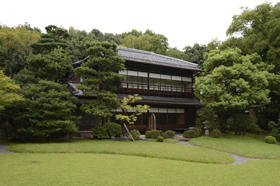Vol.1 Interview
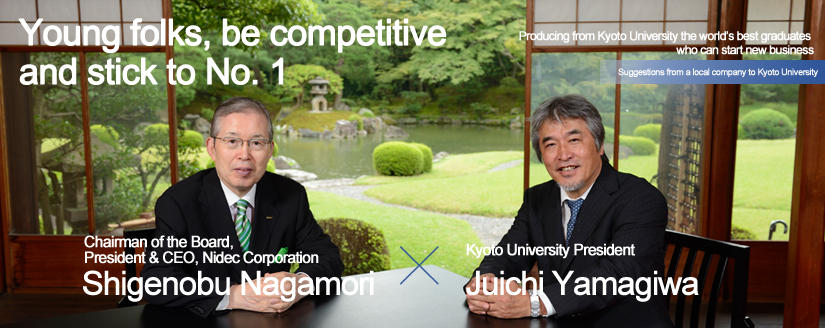
Shigenobu Nagamori
Shigenobu Nagamori was born in Kyoto Prefecture in 1944. He graduated from The Human Resources Development and Promotion University (currently, Polytechnic University), Department of Electricity in 1967. He worked for TEAC Corporation and Yamashina Seiki Co., Ltd. and then established Nidec Corporation and became its President in 1973 when he was 28 years old.
Nidec Corporation is the world's number one motor manufacturer.
Founder and Chairman of the Board/President & CEO Shigenobu Nagamori developed his business into a company with annual sales of one trillion yen for the fiscal year of 2014, in just 42 years since its establishment.
The company has been consistently focused on motors since its establishment, such as small precision motors, automotive motors, home appliance motors, commercial and industrial motors. Although the rapid growth was led by active M&A deals, they were always those where synergy with its primary motor products was expected.
In 2012, the Nidec Research and Development Center for motors was established. In 2014, the Nagamori Awards, which is an awards program for motor engineers, was established. Nagamori always tries to deepen work on motors. In 2016, vocational training in the company is scheduled to be launched to focus on training future leaders.
Reaching annual sales of one trillion yen is just a stepping stone for the company. It is on track to make the dream of "10 trillion yen in sales for the fiscal year of 2030" a reality - in order to be an important and indispensable company in 100 years.
Since Kyoto University President Juichi Yamagiwa took office in October 2014, President Nagamori, who is said to be the most powerful and a charismatic leader, has been serving as a special advisor to the University President. Recently, President Nagamori and President Yamagiwa met in Seifuso Villa to have discussions. President Nagamori has delivered messages, including complaints and suggestions, to the University and the University students.
"A business manager who respects his/her mother never fails"
My mother's teaching "Do it at a dead run"
Yamagiwa
I heard that you were born in Kyoto and are the youngest of six brothers. In reviewing interviews with you, I often see a story about your mother.
Nagamori
I was born when my mother was in her 40s. I endeared myself to my mother, but she treated me with tough love, not doting on me. She was a woman of the Meiji period (1868-1912), had an inner strength and hated to lose. When I came home crying after losing a fight, she goaded me and told me to go and fight again.
In 1973, when I was 28 years old and decided to start my own company, she told me not to do such a dangerous thing, but she finally accepted this on the condition that I work twice as hard as anyone. If someone works twice as hard as anyone, he/she will succeed. This is my mother's teaching. When I was a kid, I never saw my mother sleeping. She showed us the way she worked hard on her own. My promise to my mother is the base of our company culture "do it at a dead run".
Yamagiwa
I was impressed by your words "a business manager who respects his/her mother never fails", which you said in a meeting before.
Nagamori In fact, top corporate executives feel cut off and lonely. They have no one to turn to, so their mother's words provide them with spiritual support. A week before my mother died, I went to see her during the daytime, but she told me off saying "what are you doing at this time?" I was told by her that I had many employees and shouldn't delay my work due to her illness. Until just before she died, she wanted to tell and teach me that I would not succeed if I didn't work with that spirit.
Stick to No.1.
Always aim for a higher summit
Yamagiwa
"Stick to No. 1" is one of your company's management principles and you said "any place other than No. 1 is same as the last place". Is this due to the influence of your mother?
Nagamori"Stick to No. 1", my mother used to say. Be the first to arrive at school. Put your shoes in box No. 1 of the cupboard for shoes at a public bathhouse. Something like that.
Yamagiwa
It's important to aim for number one. I want our students to be always aware of this.
Nagamori I now tell our researchers and engineers that No. 1 is not good enough and we need to aim for a clear victory of 70-80 percent of world market share. You cannot know good and bad until you win the first place.
Yamagiwa
The goal for the people who come in second or third place is to win first place. However, if you win first place, you need to find another goal. This is a huge difference.
I understand that you stick to No. 1 due to the influence of your mother, but is it also influenced spurred by the characteristics of the locality of Kyoto? I believe that there are many people in Kyoto who deal with the world.
Nagamori It may be. I always try to socialize with people whom I can learn from and to aim at higher goals without being satisfied with the current status. The higher the goal, the harder it is to reach this goal. More training will be required. Just work hard and learn from each other.
Yamagiwa
The pioneer of Japanese primatology, Kinji Imanishi, established an alpine club for Kyoto University graduates. The spirit of the club is "be the first person to reach the summit". He kept on saying that it is the spirit for alpinists to aim to reach the summit of a mountain which no one has ever reached before.
Nagamori That's the spirit leading to all aspects, from research to product development. Trying to do things that other people haven't. That's the spirit of Kyoto University and that's why the University produced so many Nobel Prize laureates.
Yamagiwa
Not following suit is difficult and results in much suffering, but if you do so, you can open a new world.
Nagamori Even though the University has such an academic culture, we don't often hear that its students have set up a venture company. Most students wish to work for large companies.
Yamagiwa
Unfortunately, that's true
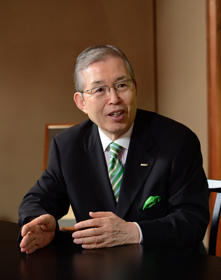
Obstacles to creating startups include
mothers, partners, and systems
Nagamori At prestigious American universities, approximately the top 10 students will set up venture companies and the other students will join large companies. This is the opposite of Japan.
When I established my company, my mother was told by people around her that she was helping her son do something dangerous. A son of my neighborhood worked for a large company and was told that he was working for an excellent company. This is the general social valuation in Japan.
Yamagiwa
As a reason why Kyoto University students lack ambition and aspire to large companies, the "influence of their mothers" is pointed out. There are many students who are told by their mother to try to find a steady job as a Kyoto University student. Another reason is that there are few partners with whom students can share a sense of purpose.
Nagamori
In our company, there is an example in which the mother of a potential employee said to the recruit "I don't know Nidec, so find a job at another company".
Yamagiwa
The system is different, too. In the US, there are well-developed support systems to help people form a startup company.
Nagamori In their society, they are allowed to fail and easily have an opportunity to make another try. In Japan, recently, the government supports the creation of startup companies and the system for fund raising has changed, however, there is still a high bar. There are venture capital companies, too. However, while a large amount of money will be required during the period of several years from the establishment of a startup, it is difficult to receive financial support for that period.
What a leader should do is to maximize
the motivation of the employees
Yamagiwa
Your company has grown under a core strategy of M&A. Do you need any special skills in M&A deals?
Nagamori
Corporate restructuring is the most challenging work where you can develop your managerial skills. A company ends in the red and morale of employees is lacking. You need to reconstruct such a company. Moreover, in our company, we do not lay off any staff members. It is difficult to double the skills of employees, but their motivation can be increased by 100 times. There is a case where a company that had been running an annual deficit of 10 billion yen every year, posted a record high profit in only one year. The keystone of management is how to motivate employees. If the leaders change, the awareness of employees as well as company will change.
Yamagiwa
Organizations cannot be developed by individual ability, so leaders need to have the skills to recognize individual capabilities and propose how to combine them and what to do with them. Since Kyoto University students are expected to be leaders in various fields in the future, the University should play a role in helping students to develop such skills.
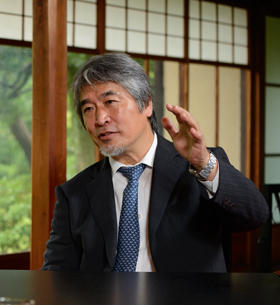
What is required in globalization
is to talk about technology and dreams
Yamagiwa
I believe that globalization is an important step in the process of establishing and developing a company.
Nagamori Actually, our first customer was an American company. When I first visited a Japanese company after I established my company, they only asked me my age, the number of years since establishment, or the number of employees, and since I had no experience, I get turned away at the door. Accordingly, I went to the US. In the US, they only asked me what advantages we can provide them with. The US is a country with many startup companies since then, so if you bring good products, you will be accepted.
Conversely, if you don't have world-class technology or something, you are out of the question.
Yamagiwa
The same is true in the scientific community. One of the criteria of determining the status of globalization of the University is how many chairman of international academic associations are produced. There are two things that are required in managing academic associations for Western researchers who account for the majority of the community. One is respectable performance. The other is future concept. If you cannot present attractive plans for the association's future, no one will follow.
Nagamori They are important things. I go to an acquired company and tell them this at the beginning: "Just for one year, please follow me, just for the heck of it". Then, I talk about the vision a year later. A business managers' work is to talk about their dream and have it come true.
Motors will be the third "rice" in industry
Urgent need to train personnel in manufacturing
Yamagiwa
In 2014, you established the Nagamori Awards, which is an awards program for motor engineers, and in August 2015, three Japanese and three non-Japanese engineers were awarded.
Nagamori In the 1980s, the main products in industry were iron and steel, later it was semiconductors, and I believe that from 2020 onward, motors will be the main product, the third "rice", in industry. In fact, more than half of the world's electricity demand is consumed by motors. If energy-saving motors are created, that would have a profound effect. Motors have the possibility to play an important role in solving environmental and resource problems. Nevertheless, the number of researchers involved in motors is decreasing. Courses on motors at universities in the world are disappearing. The current situation is that not very many people come to the core point of hardware, or manufacturing field. I can't just look on without doing anything. That's the reason why I began to work on the Nagamori Awards.
Yamagiwa
In today's Japan, the "trust in technology", which is the driving force in promoting hardware manufacturing, has been shaken and undermined. When I was a kid, we used to foster trust and respect in technology through the experience of putting together transistor radio on our own as we could contrive. Nowadays, technology is no longer what we create on our own.
Nagamori
Disrespect for manufacturing is a huge issue. I would like everyone to know what a fascinating world the hardware field is.
Yamagiwa
Since a third of our students are engineering students. We would like to help our students foster their aspirations for manufacturing and develop their huge ambitions to change the world with technology. One prescription for this is to provide continuing education for adults. While in the US, 20 to 30 percent of university students are adult students, in Japan, less than 2 percent are adult students. We would like to create a competitive environment where if young people just sit around and do nothing, they will be overtaken by adult students in terms of technology and other resources.
Producing entrepreneurs will increase the value of the University
Nagamori In Japan, many engineers are just engineers, and there are few business managers who understand technology. I believe that this is one of the reasons why business management has weakened in Japan. In the US, there are many cases where after working for a company for about ten years, an engineer goes to business school to earn an MBA degree and moves into the field of business management. Not only young people but also people in their 40s are actively trying to establish startups.
Yamagiwa
They are broadening their own field, not narrowing it down. I believe that knowing both sides will result in gaining the trust of employees.
Nagamori To that end, universities can play a significant role in training such personnel. Meanwhile, if more and more students and graduates choose to become entrepreneurs and build a broad network in the business world, students will come to the University from all over the world, which should result in the increase of the value and ranking of the University. Taking into consideration that many overseas successful entrepreneurs are donating a large amount of money to their alma maters, Japanese universities should focus on this area.
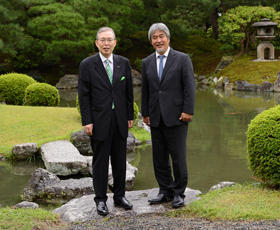
Knowing about Kyoto and companies in Kyoto
Producing great business managers and personnel who will play an important role in Kyoto
Nagamori
There are two things that I find disappointing about at Kyoto University.
The first is that there have been few graduates who started their own business and developed it into a company with sales of more than a trillion yen or who are outstanding in the business world. For companies, the largest contribution to society is job creation. This is very important. The world's best university should train the world's best graduates who can create a company.
The second is that there are few graduates who work for local companies in Kyoto, even though there are many good companies in Kyoto. If more and more graduates work for and play an active role in companies in Kyoto or create a startup in Kyoto, this would be ideal situation and the largest contribution to the local community.
Yamagiwa
We are also concerned that there are many students who don't know about Kyoto or companies in Kyoto. As a consequence, we are considering encouraging the "Kyoto and Universities Campus Program", which plans to make the whole of Kyoto a large university campus, and linking students to Kyoto through further collaboration with local governments, the business world, and other universities. It will be highly possible in the future to use ideas from completely different fields, so learning in Kyoto itself, where you can find various cultures and ideas, will be a strength.
Nagamori Internship would also be an effective way. I hope that more and more students realize the advantages and strengths of the local companies in Kyoto through their working experience there and continue to stay in Kyoto.
Find your possibility in a stimulating environment
Strive for improvement and continue to challenge
Nagamori As we discussed previously, the reasons why so few students establish startups include social validation, influence of their mother or partner, or problems with the inadequate support system. However, the crucial thing is the awareness of young people. I gave a lecture at Kyoto University last year, but only overseas students asked questions actively.
Yamagiwa
I'm afraid so. Accordingly, we are considering that it is necessary to increase ambitious students from overseas to raise the awareness of Japanese students.
Nagamori A long time ago, a Japanese person who studied at Harvard University said to his fellow students: "After graduation, I will return to the company I worked for". He was scorned by them. They said that they came there to learn to create a company. After returning to Japan, he quit the company and established his own company. It happens a lot that students get stimulated by the environment or their fellow students.
Yamagiwa
Moreover, what is important for students is to realize that they have a variety of possibilities. I hope they have an experience of jumping into a whole new world, putting themselves to the test, and discovering and being impressed by new things.
Nagamori By going through many successful experiences, people become confident and strive for improvement. Although there are a lot of things to reform, such as systems and awareness, I expect that they will change during your term of office.
Yamagiwa
Thank you. We will do that "at a dead run" to respond your expectations.
(Held in September 2015)
■ Seifuso Villa ■
Seifuso Villa was built by the Sumitomo family during the period from the end of Meiji era to the Taisho era as Kinmochi Saionji's private residence in Kyoto. To commemorate Kinmochi's support for the foundation of Kyoto Imperial University as education minister, Seifuso Villa was donated to Kyoto Imperial University in 1944. It was designed by Jinbei Yagi the second, who worked for the Sumitomo family, and the garden was designed by Jihei Ogawa the seventh. A private-residence-like, composed atmosphere is created by the exquisitely designed Sukiya-zukuri (tea ceremony room architecture) and the garden with gently undulating mounds and wealth of water. The garden was designated as a place of scenic beauty in 1951 and Seifuso Villa was designated as an Important Cultural Property (building) in 2012.
*Seifuso Villa is not open to the public.
